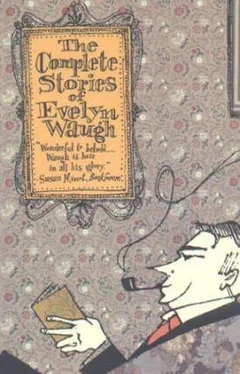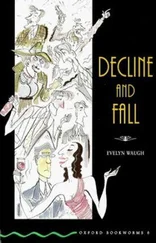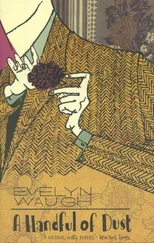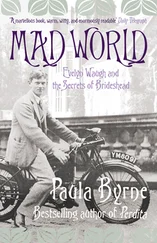Evelyn Waugh - The Complete Stories Of Evelyn Waugh
Здесь есть возможность читать онлайн «Evelyn Waugh - The Complete Stories Of Evelyn Waugh» весь текст электронной книги совершенно бесплатно (целиком полную версию без сокращений). В некоторых случаях можно слушать аудио, скачать через торрент в формате fb2 и присутствует краткое содержание. Год выпуска: 1998, ISBN: 1998, Жанр: Классическая проза, на английском языке. Описание произведения, (предисловие) а так же отзывы посетителей доступны на портале библиотеки ЛибКат.
- Название:The Complete Stories Of Evelyn Waugh
- Автор:
- Жанр:
- Год:1998
- ISBN:0-316-92546-2
- Рейтинг книги:3 / 5. Голосов: 1
-
Избранное:Добавить в избранное
- Отзывы:
-
Ваша оценка:
- 60
- 1
- 2
- 3
- 4
- 5
The Complete Stories Of Evelyn Waugh: краткое содержание, описание и аннотация
Предлагаем к чтению аннотацию, описание, краткое содержание или предисловие (зависит от того, что написал сам автор книги «The Complete Stories Of Evelyn Waugh»). Если вы не нашли необходимую информацию о книге — напишите в комментариях, мы постараемся отыскать её.
The Complete Stories Of Evelyn Waugh — читать онлайн бесплатно полную книгу (весь текст) целиком
Ниже представлен текст книги, разбитый по страницам. Система сохранения места последней прочитанной страницы, позволяет с удобством читать онлайн бесплатно книгу «The Complete Stories Of Evelyn Waugh», без необходимости каждый раз заново искать на чём Вы остановились. Поставьте закладку, и сможете в любой момент перейти на страницу, на которой закончили чтение.
Интервал:
Закладка:
“… invited ‘pretender’ to Spain and arranged with Görz a northern alliance with Sweden and Russia to support the Stuart claims, while at the same time he entered into correspondence with Polignac and the Duchess of Main, to overthrow the Regency. The death of Charles XII, however…..”
Mr. Boyle’s notes did not elucidate any difficult problems or sift the important facts of history from the trivial. They merely stated things in direct paraphrase of Lodge; for the whole double period Peter steadily took them down.
At last the clock chimed and Mr. Boyle stood up, shut his note book and took up his mortar board. “That will be enough for this morning, I think. Remember that I want the essays on ‘The Freedom of the civilized State’ by Monday evening, without fail this time please. I will ask you to read up Catherine the Great for next Tuesday, if you will—I recommend Lecky. Thank you, good morning.”
Wearily they filed out for break. In the war time efficiency mania P.T. had been innovated which effectually took up all the break—ten minutes in which to change and twenty minutes drill. Peter hurried to the changing room and began undressing; he suddenly remembered that he had broken the lace of his gym shoe the day before. He succeeded in borrowing another and then realized that he had forgotten to get a new hat for parade as he had been told to last time. Everything seemed to be conspiring against him this morning.
“You never lose a stud but you lose the lot,” sighed Bellinger, “Hullo, what the devil does he want.”
Peter looked round and saw the porter’s burly figure framed in the doorway.
“Telegram for Mr. Audley, sir.”
“Hullo, what?” Peter tore open the orange envelope and hurriedly took out the telegram; it was getting late for P.T.
“Ralf on leave,” it ran, “return home wiring head will meet 4:52 Bulfrey.”
IV
One of the awfully clever things that Ralf had said was that life should be divided into water tight compartments and that no group of friends or manner of living should be allowed to encroach upon any other. Peter lay back and compared the day with the prospects early that morning.
As soon as he had got the telegram he had put on his shoes and told the porter to ’phone for a taxi. After a frantic search for his house master and an incoherent but convincing explanation to him and a hurried interview with the matron about his bag, he had managed to get away in time to catch the 11:12 to Victoria. There he had had a hasty but excellent lunch at the Grosvenor and had dashed across to Paddington and got into the train just as it was starting.
He now had a clear two hours run to Bulfrey. He lay back and took a cigarette from the box he had bought at lunch. Very contentedly he watched the telegraph wires rising falling and recrossing each other, mile after mile.
He had not had time in the rush of half packed pyjamas, moving trains and lost tickets, to think of what it all meant; now in the empty first class carriage with magazines and cigarettes he began to shake off the shadows of the prison house. He looked at his watch. At the very time that he was swaying into the country through the short wayside stations, Bellinger and Beaton and Garth and everyone else with whose lives his own had seemed so inextricably bound that morning were marching about on the downs. It was very cold at Selchurch, he reflected and the sea mist was lying in the valleys; he was warm with the close atmosphere of the carriage and the glass of port he had had after lunch and with a deep inward content.
Mile succeeded mile through the avenue of telegraph poles. Outside the weather was clearing up and a bright cool sun came out. He watched the fields reeling by and began to pass the landmarks which had grown familiar through many home comings, an imposing patent medicine factory, the neat beds of a large market garden, an Elizabethan farmhouse.
He wondered how long this unexpected holiday was going to last; he supposed about four days. This was really the first time that Ralf had made any mark in his life; he was five years older and had always kept himself very much aloof. They had had many quarrels as brothers always have. At times Ralf had been almost a prig, particularly when he was head of the house at Selchurch, and his first year at Oxford. Anyway it was through him that Peter was now sitting in comfort instead of marching his section up a wet hill in “blob” formation, and in the warmth of heart that can come only from physical comfort, Peter prepared to be very gracious towards his brother.
At last the train slowed to a stop and stood panting but unexhausted like a well-trained runner. Peter suddenly realized that they had reached Bulfrey. He snatched up his hat and bag, buttoned his coat and leapt onto the platform. Ralf was striding down towards him.
Peter had seen him in uniform before but then it had been with the timid pride of a 1914 subaltern. Now after three years fighting he looked wonderfully fit and hansome. A slanting ray of sunlight lit up his fair hair; he was wearing no cap.
“Hullo, Peter,” he cried, shaking hands, “we were afraid that you mightn’t be able to get the train. I suppose you’ve had lunch?”
“Yes thanks, I managed to get some in town. Pretty fair rush though. Hold on a second while I find my ticket.” He handed Ralf his bag and began exploring his pockets. Finding it, at last, between the leaves of his school “blue-book,” he gave it to the collector and taking back his bag followed his brother out.
“Is that all the luggage you’ve got?” he asked, “That’s splendid; we shall be able to bring it up with us now. I’ve got the dog-cart outside. Moira’s looking after it. She was coming into Bulfrey to do some shopping so I asked her to come and meet you.”
Moira Gage was the daughter of the vicar of Bulfrey Combe. Peter’s age, she and her brother had been the constant companions of the Audley boys before they went to school. They had seen less of each other as they grew up, Chris had gone to Winchester, Ralf and Peter to Selchurch, but the Vicarage was next door to the Hall and they had seen a good deal of each other in the holidays. Their fathers were close friends.
“Good work, I was afraid she would be away doing that V.A.D. work. I only saw her once all last holidays. Ah there she is.”
They had come out into the small station yard. On the other side of it stood the dog-cart and in it stood Moira Gage, one hand holding the reins, the other shading her eyes. She was tall, slim and pale, not really pretty but graceful and attractive; from a distance she looked like a Shepperson drawing but when you got nearer you saw depths in her grey, scrutable eyes, which his charming mannerisms could never convey; she was dressed in a tweed coat and a skirt with a grey silk scarf over her shoulders. Peter ran forward and greeted her.
“Peter,” she said, “before you do anything else, do make Ralf put his hat on. He looks simply dreadful and I’m sure he’d be court-martialled or something, if anyone saw.”
“Three years of military life shatter any illusions about military discipline,” Ralf replied, climbing up into the dog-cart, “the only hardened militarist nowadays is the newly conscripted civilian.”
“Now he’s being clever again,” Moira laughed, “I really thought you lost that when you came down from Oxford. Among other things, it’s very bad manners when you are in stupid company.”
“Thank you,” Peter expostulated, “I wish you’d speak for yourself. I’m in the sixth now and write essays on industrial history and all sorts of things.”
“You seem to regard your history with most unreasonable pride,” said Moira, “from all I hear it sounds only slack.”
Читать дальшеИнтервал:
Закладка:
Похожие книги на «The Complete Stories Of Evelyn Waugh»
Представляем Вашему вниманию похожие книги на «The Complete Stories Of Evelyn Waugh» списком для выбора. Мы отобрали схожую по названию и смыслу литературу в надежде предоставить читателям больше вариантов отыскать новые, интересные, ещё непрочитанные произведения.
Обсуждение, отзывы о книге «The Complete Stories Of Evelyn Waugh» и просто собственные мнения читателей. Оставьте ваши комментарии, напишите, что Вы думаете о произведении, его смысле или главных героях. Укажите что конкретно понравилось, а что нет, и почему Вы так считаете.












